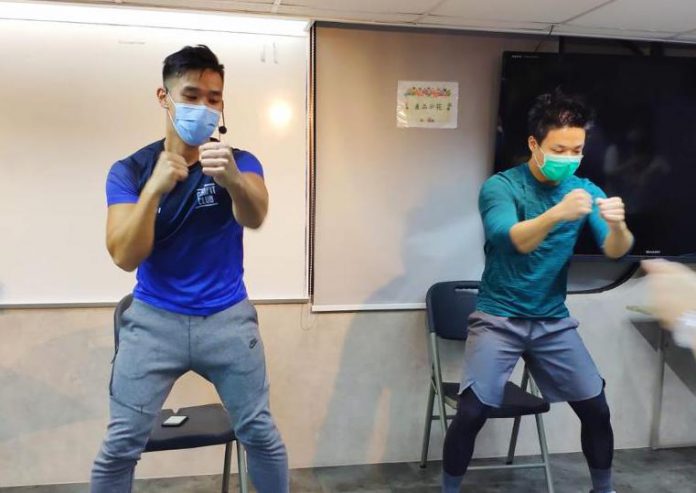COVID-19 reminds many of how important a healthy lifestyle is.
By Charlie Yip
“I had two bowls of rice for dinner, and very often, I had ice cream for dessert,” university student Stephanie Chan says, recalling her eating habit at the beginning of the pandemic earlier this year.
Physical classes in Hong Kong were suspended and online teaching was adopted by all schools from kindergartens to universities in January this year.
Chan is also one of those affected students. Her physical activities have been greatly reduced due to the outbreak of COVID-19. Like many she has been doing her study at home and practising social distancing.
The change of lifestyle is reflected in her weight which went up to 58 kilograms in COVID-19.
“I went hiking during school suspension in February. Looking at photos taken during the hiking trip, I realised how much weight I put on. I looked really chubby!” Chan says, blaming the change of lifestyle caused by the pandemic.
In the wake of the COVID-19 pandemic, the government has tightened social-distancing rules like mandatory mask-wearing at all public venues, limiting social gatherings and closing leisure venues and gyms since the beginning of this year.
Many Hong Kongers self-quarantine at home. They choose to work and dine at home to avoid going out.
An insurance company Sun Life conducted a survey in September this year. Findings show 52 per cent of them gained weight, and over 40 per cent of them did not exercise at all, starting from the beginning of the pandemic.
Over 900 Hong Kong people aged between 20 and 55 were interviewed about their eating and exercising habits during the pandemic period in the poll.
Acknowledging health problems brought by the change in lifestyle during the pandemic, Chan starts preparing healthy meals for herself.
“Having online classes at home allows me to cook my three meals and to think about how to eat healthier. I lost 5 kg from February to May. Now I look much better on camera,” she says.
Chan cut down carbohydrates intake at dinner from February to May. “I have reduced portions and eaten more vegetables, and also stopped eating ice cream after dinner,” she says.

Immune System is the Key
Certified international nutritionist and weight loss coach, Thomas Kwok, observes that there is a rising trend of weight gain when people try to avoid infection by staying home.
“People stay at home for too long. They consume more (food) and expend less energy,” he says.
Kwok explains that walking is the basic and easiest way to burn calories, but those who are working from home walk much less.
“All recreational activities have been restricted. Many watch movies at home, giving them a very good reason to have snacks,” he adds.
Kwok says the key to fight COVID-19 is having a strong immune system. He recalls nobody had any idea about how to fight the virus at the beginning of the outbreak.
“What people did was purely washing their hands and practising social-distancing. The importance of a strong immune system is highlighted when symptoms appear to be more severe on elderly and chronic patients,” he explains.
In June, 2020, the Faculty of Medicine of the Chinese University of Hong Kong held a press conference unveiling the balance of the benign and harmful intestinal bacteria is the main immune system that combats COVID-19.
Kwok says more people have started to purchase probiotics and vitamin C supplements to enhance their immune system after learning the study results.
“People are now more conscious about their health, knowing that not every illness has a cure,” he says.
Health Taken for Granted
Lares Beauty, an online food company that provides meals that are low in calories and fat by using ingredients high in fibre such as fresh vegetables and fruits, has gained popularity during the pandemic, as more are becoming health conscious.
Founder, Eli Lam, says her business grew by 20 per cent on average from July to September, 2020.
“We have new promotion plans that are designed during the pandemic such as ‘Stay At Home Set’, consisting of meal plans for people working from home,” Lam says. It includes various meals like curry chicken, beef burgundy and braised beef etc.
“In the past, my customers consulted us on what to eat to lose weight. Now, they want to learn more about processed food, and whether preservatives and additive agents are added in my products,” Lam adds.
She recalls some young customers once told her that healthy food was not what they would choose in a promotion event before the pandemic.
But Lam now sees a change in their mindset. “They have become more health conscious after learning that anyone can be infected by COVID-19 regardless of age,” she adds.
(Photo courtesy of Lares Beauty Meal)
Energy Expenditure is Indispensable
Marcus Tong, a qualified fitness trainer and a physical education teacher, also finds the public have become more health conscious.
He has received more requests for health consultations and advice on doing exercise during the pandemic.
“Many are lacking basic cardio training like walking. I can see that my students have gained weight. They have become less willing to exercise after months of school suspension,” Tong says.
As a founder of a fitness club, Tong thinks the pandemic has changed the exercising habit of many. He says many go hiking or do water sports and some do household exercises like high intensity interval training, which is a cardiovascular exercise of alternating periods.
“After the government has decided to limit social gathering to only a few, many fitness training groups use Zoom as a communication tool to monitor progress of participants. This is an unprecedented breakthrough in exercising mode,” he says.

The Department of Health says physical activity can boost immune system and defend the body from infections including respiratory infections.
“The World Health Organization (WHO) recommends adults to engage in at least 150 minutes a week of moderate-intensity aerobic physical activity, or at least 75 minutes a week of vigorous-intensity aerobic physical activity, or an equivalent combination of moderate- and vigorous-intensity activity, as well as muscle-strengthening activities involving major muscle groups on two or more days a week,” a spokesperson of the department says in a written reply.
Edited by Lasley Lui & Regina Chen









































